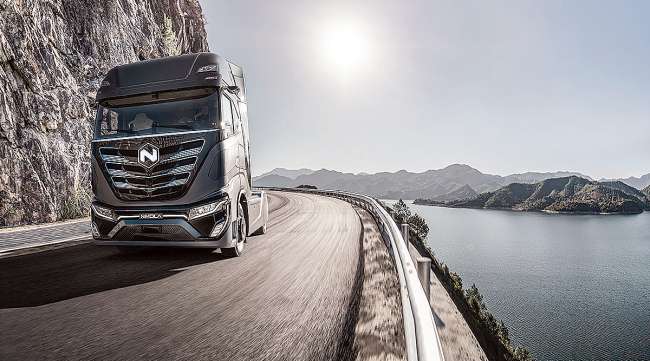Senior Reporter
Nikola to Launch New US Plant With Tre Cabover Model

[Stay on top of transportation news: Get TTNews in your inbox.]
The battery-electric cabover Nikola Tre model will be the first Class 8 off the assembly line at Nikola Corp.’s 1 million-square-foot manufacturing facility on a 430-acre site in Coolidge, Ariz. The company broke ground on it in July.
“We are bringing the cabover back to America,” Nikola President Mark Russell said. Interest among potential customers has centered on using it as an urban delivery truck, he added at a virtual press conference the day before the groundbreaking.
Nikola is using the S-Way platform from European truck maker Iveco as the basis for its trucks at a plant in Ulm, Germany. The Tre for North America will be slightly longer and come with a 6 × 4 axle configuration compared with the European model, which is scheduled to start production in 2021.
Yesterday's groundbreaking of the new Nikola Coolidge manufacturing facility brought together those who know the project best. Several even took center stage to share the journey from their perspective. Take a look: https://t.co/s8NhMZSlrz #NikolaGroundbreaking #CoolidgeArizona — Nikola Motor Company (@nikolamotor) July 24, 2020
The Coolidge plant, located about halfway between Phoenix and Tucson, Ariz., is being developed in 3.5 phases. The first phase of construction is scheduled for completion in late 2021, with the second phase projected to be finished within the following 18 months.
“The residents of Coolidge will be a huge part of the Nikola story, and without the help of Gov. [Doug] Ducey and the Arizona economic development teams, this project would not have been possible in Arizona,” founder and Executive Chairman Trevor Milton said. “These next 12 months will be even more exciting as we see this facility go up and as we add more Arizonans to the Nikola team.”
The first phase of truck production will be for both BEVs, then fuel cells, he added.

Milton
“The fuel cell is about one year behind the BEVs in the production schedule, but five trucks are in pre-production and coming off the production line in Ulm,” Milton said. “After testing, changes will be made and those will be built at the Coolidge plant, as well, for the North American market.”
“[The .5 phase] will be a partial facility so we can start as soon as possible. We are very early in the development of that plan,” said Mark Duchesne, Nikola’s global head of manufacturing. “We have a need to build trucks even sooner than what we planned on, and we are working on how we can do that. [The .5 phase] will be hand-built, slow built. Then we will ramp up from there as we implement Phase 1.”
Phase 3 will involve looking at building the entire cab in Coolidge, he said.

Transport Topics introduces its newest digital interview series, Newsmakers, aimed at helping leaders in trucking and freight transportation navigate turbulent times. Audience members will gain access to the industry's leading expert in their particular field and the thoughtful moderation of a Transport Topics journalist. Our second episode — "The Evolution of Electric Trucks" — featured Nikola founder and executive chairman Trevor Milton. To view the replay, complete this form.
Milton said the fuel cells eventually would arrive at the plant as complete units, but Nikola will do battery assembly at the plant.
“You do not want to be shipping batteries, they are very heavy, very complicated,” he said.
Nikola is testing multiple fuel cell platforms from suppliers, but as of now, Milton expects the fuel cells to come from Bosch.
He said customers will be responsible for charging their own BEV vehicles and paying the going utility rates.
“No matter what, it’s still cheaper than a diesel,” Milton said. “We just have a big grid problem to solve. We are not alone; everybody is going to have that issue [with electricity rates].”
Nikola’s hydrogen fuel cell models will be offered on a bundled lease, including fuel and maintenance for seven years or 700,000 miles.
“It’s very easy to predict [the cost of hydrogen] because we can produce hydrogen [at its planned fueling stations] whether there is a truck there or not,” Milton said. “Hydrogen is the key to everything with Nikola in our ability to separate ourselves from our competitors.”
Hydrogen costs about $4 a kilogram, and Nikola is working on a target of between $2 and $3 a kilogram, Milton said.
“Adding standardization is everything when it comes to the cost of hydrogen,” he said. “In America, there are almost no stations that use the exact same [infrastructure] footprint.”
Nikola’s approach is based on standardizing the construction and production process to drive the cost down. Its goal is to get the cost of its network of stations below $10 million each.
Meanwhile, the new plant is expected to generate about 2,000 jobs in the area.
And if there is something Milton wants to talk about with Ducey (who founded Cold Stone Creamery), he has his phone number. And the governor, with a firsthand appreciation of entrepreneurs, takes his calls.
Nikola looked at possible locations for the plant in several states.
“Other governors wouldn’t give you their cell,” Milton said. “They wanted all these separations.”
Want more news? Listen to today's daily briefing:
Subscribe: Apple Podcasts | Spotify | Amazon Alexa | Google Assistant | More




